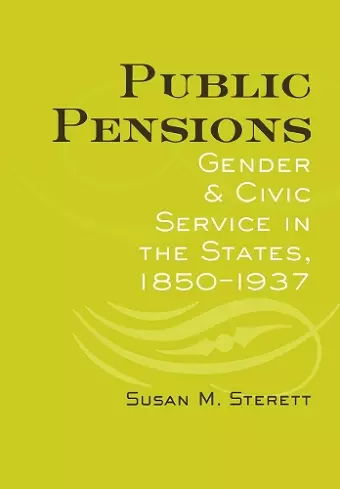Public Pensions
Gender and Civic Service in the States, 1850–1937
Format:Hardback
Publisher:Cornell University Press
Published:9th Jun '03
Currently unavailable, and unfortunately no date known when it will be back

In Public Pensions, Susan M. Sterett traces the legal and constitutional structures underlying early social welfare programs in the United States. Sterett explains the status of state and local government payments for public servants and the poor from the mid-nineteenth century until the Great Depression. The most visible public payments for service in the United States were directed to soldiers, who risked death for the nation. However, firemen, not soldiers, first captured local governments' attention; social welfare programs for soldiers were modeled on firemen's pensions. The dangerous work of firefighting and of combat provided the fundamental legal analogy for courts as governments expanded pensions in the late nineteenth and early twentieth centuries.
Nothing about the state court doctrine approving payments for dangerous, local service would allow pensions for indigent mothers and for the elderly, which states began to consider after 1910. Counties and railroads that objected to the new taxes could fight programs based on the old doctrine, established for firefighters, soldiers, and finally civil servants. State litigation provided one of the many grounds for contesting expanded welfare states in the early twentieth-century United States. Sterett demonstrates that state courts maintained a gendered division between the service that marked citizenship and the dependence that marked indigence, even during the promising ferment of the early twentieth century.
Susan M. Sterett has added an important perspective to recent social welfare scholarship. Her insight is that state court litigation after the Civil War played a major role in shaping state public pension legislation, especially as new groups were added to the eligibility list.
-- Anthony R. Travis, Grand Valley State University * The Journal of American History *Public Pensions illustrates how substantially state constitutions shaped the evolution of American social welfare.... This excellent book adds immensely to our understanding of pensions, work, dependency, and American constitutional culture. It constitutes an extraordinary contribution to the scholarship on this very important topic.
-- Constance Backhouse, University of Ottawa * Labour/Le Travail *Sterett... urges scholars studying the welfare state's history to pay closer attention to state courts and the public purpose doctrine, which held that state funds could be spent only on charity to the intrinsically dependent, on businesses providing general public benefits, or in rewarding people who had served the state.... Summing Up: Recommended. Graduate, research, and professional collections.
* Choice *Sterett applies gender analysis in an interesting way to the legal arguments that distinguished entitlements for 'manly' and heroic work from care of the dependent and weak.
-- Joan Smyth Iversen, SUNY Oneonta * History *Susan Sterett... has given us a meticulously researched and highly informative study of the legal evolution of public pensions from the latter half of the nineteenth to the first half of the twentieth centuries.... Sterett not only investigates a field of law that has been previously neglected, into her analysis of it are woven important questions about gender equity, the political meaning of dependency, the public/private distinction, as well as constitutional issues related to federalism, separation of powers, and judicial review.
-- Thomas Shevory, Ithaca College * Law and Politics Book Review *The strength of Public Pensions is Sterett's treatment of some of the early, and relatively obscure, court battles over payments to firemen and soldiers.
-- Joanna Short, Augustana College * EH.NISBN: 9780801439841
Dimensions: 229mm x 152mm x 24mm
Weight: 907g
240 pages